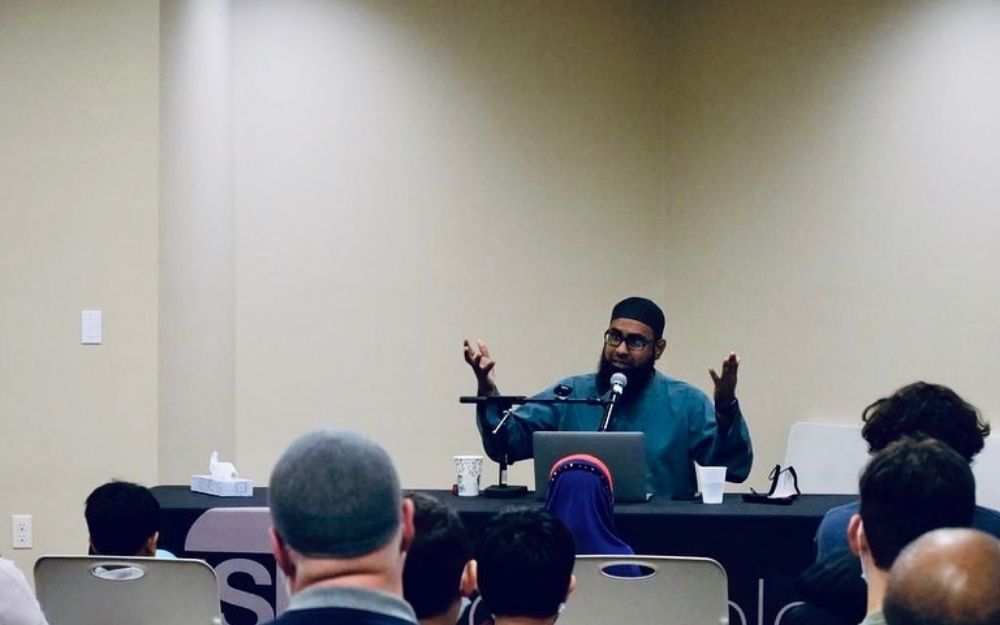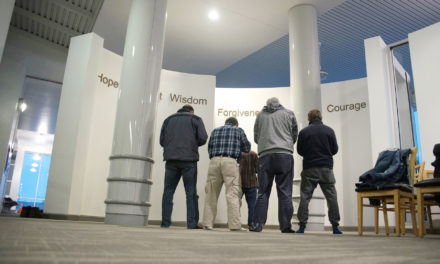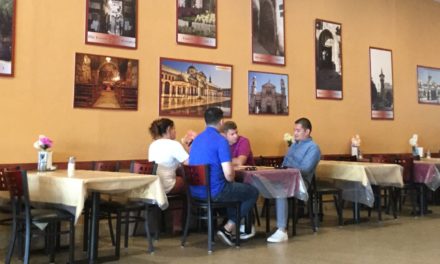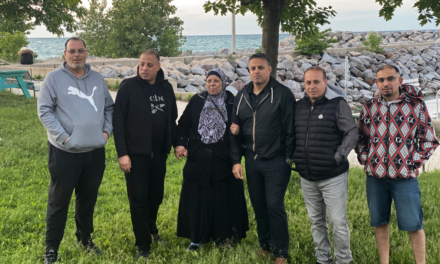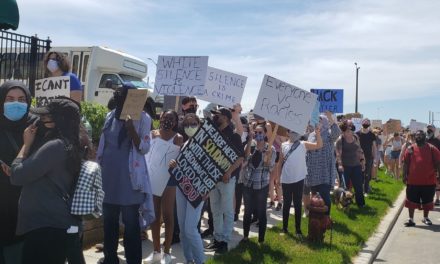Islamic Foundation resident scholar Shaykh Noman Hussain spoke about dua Sunday at Masjid Al Noor in Brookfield.
“It’s here. The season of hope, the season of mercy, has arrived. The month of Rajab is here,” said Shaykh Noman Hussain, beginning his talk about the power of dua.
Qari Hussain, resident scholar at the Islamic Foundation in Villa Nova, Illinois, returned to a full house Sunday evening at Masjid Al Noor (Islamic Society of Milwaukee-Brookfield), where he served as imam from 2015 to 2021. (Qari is a title honoring one who can recite the entire Qu’ran.)
“Dua is an important part of our daily lives,” ISM-Brookfield Council Member Tahseen Hussaini explained in a video announcement about the program. “With Ramadan coming around the corner, it is an important topic and the speaker [is] Shaykh Noman Hussain, whom we all know and love. We are excited to have him come back to Noor for this program.”
Rajab, the seventh month of the Islamic calendar, is “the time to begin preparing ourselves for the blessed month of Ramadan,” Hussain said. Rajab and Shaban are the two months preceding Ramadan, which is expected to begin April 2 this year. Dua is an important part of our preparation, he said.
In 1 hour and 20 minutes, in a room filled with families and individuals, young and old, who returned to hear their former imam, Hussain discussed dua: what it is, why it’s important and how to maximize it. (Shayk Hussain’s full talk is available on the ISM-Brookfield Facebook page.)
Dua—the essence of worship
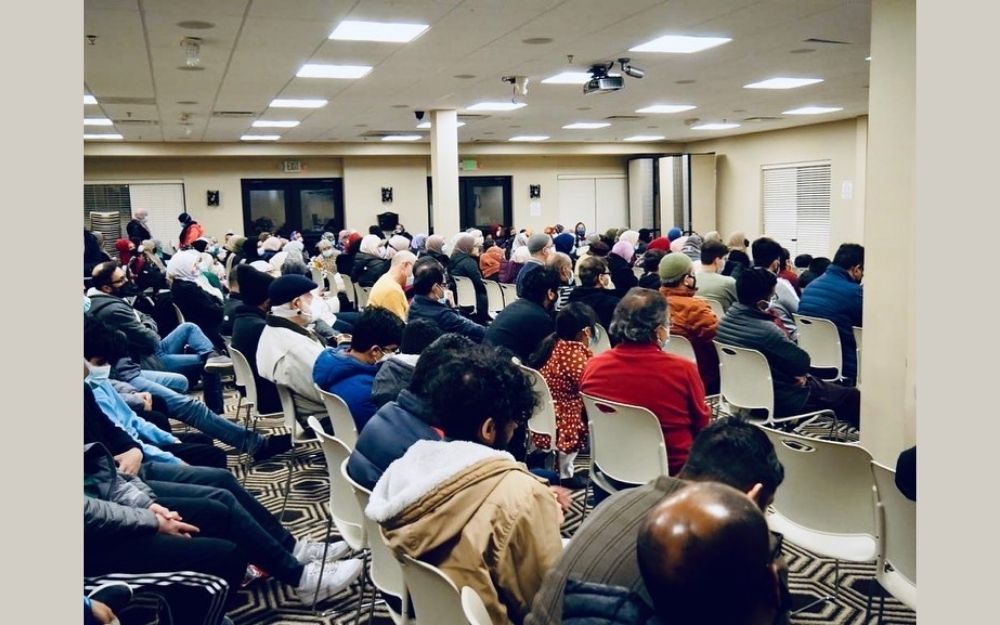
A large crowd gathered Sunday evening at Masjid Al Noor to hear Shaykh Noman Hussain’s talk on the power of dua.
Dua means “to call out to Allah (God). It is the essence of worship,” Hussain said. “Those who turn to Allah in pain, in difficulties, who is the one that responds to their cry? Allah, there is no one else.”
It brings us closer to God. “Allah says when my servant asks of Me, know that I am close. I am listening to every cry, every call. Even without words, Allah can hear the cry of the heart. This is something the Prophet (peace be upon him) teaches us.”
“Dua is a sort of therapy with our counselor, our one-to-one session one with Allah. We tell Allah, ‘I need your help to get me through the difficulties and challenges I am going through in my life.’”
It is important to realize nothing is difficult for Allah and to have confidence when calling out to him, Hussain added. He quotes from a hadith that says, “If you all came together and all of you asked me in your own languages for whatever your heart desires, and I give you everything you want, it doesn’t take away from my treasures more than if you put a needle in the ocean and took it out.”
“Approach dua asking Allah for forgiveness and with the intention to try to live a life of righteousness,” he said. Before making dua, your income and food should be free from impermissible things, he added. This is what we should do.
“This does not mean God will not hear you. We can make dua even as we are sinning. But in dua, we are letting go of the sins we are committing.”
Dua in the lives of the prophets
Examples from the lives of the prophets show what dua is, Hussain noted. He recalled the dua Prophet Muhammad (pbuh) made after facing rejection in Ta’if, where he went to share the message of Islam and faced “the worst experience of his life.” The Prophet and his companion were pelted with stones, their feet and shoes covered in blood.
In his supplication to Allah, Prophet Muhammad (pbuh) presented his weakness, not complaining Allah had not done enough for him. Rather, he recognized his need and showed confidence in Allah’s ability and mercy, Hussain said. “He is saying, ‘I’m ok with all this as long as you are not upset with me.’” He understood “dua is an opportunity to seek Allah’s help.”
“The Prophet’s companions asked the him, what type of dua should we make and he said, ‘Ask Allah for goodness and faith for this world and the hereafter.’” Sometimes we pray for things we need now and we forget about the afterlife, Hussain said.
Whenever someone asks Qari Hussain what dua to make, his “go-to” is the dua Prophet Yunus (Jonah) made from the belly of the whale: “La ilaha illa anta subhanaka inni kuntu minaz-zalimin (There is no God except You, Allah. Glory to You. Indeed, I have wronged you myself).”
“Prophet Yunus didn’t say, ‘Rescue me,’” Hussain noted. He exalted God and repented.
Prophet Ayoub (Job), who lost everything and was afflicted with sickness and pain, made a short dua, Hussain said. “’Oh Allah, I am in pain. And you are the most merciful of those who show mercy.’” He did not need to explain the details; Allah knew his pain.
When to make dua
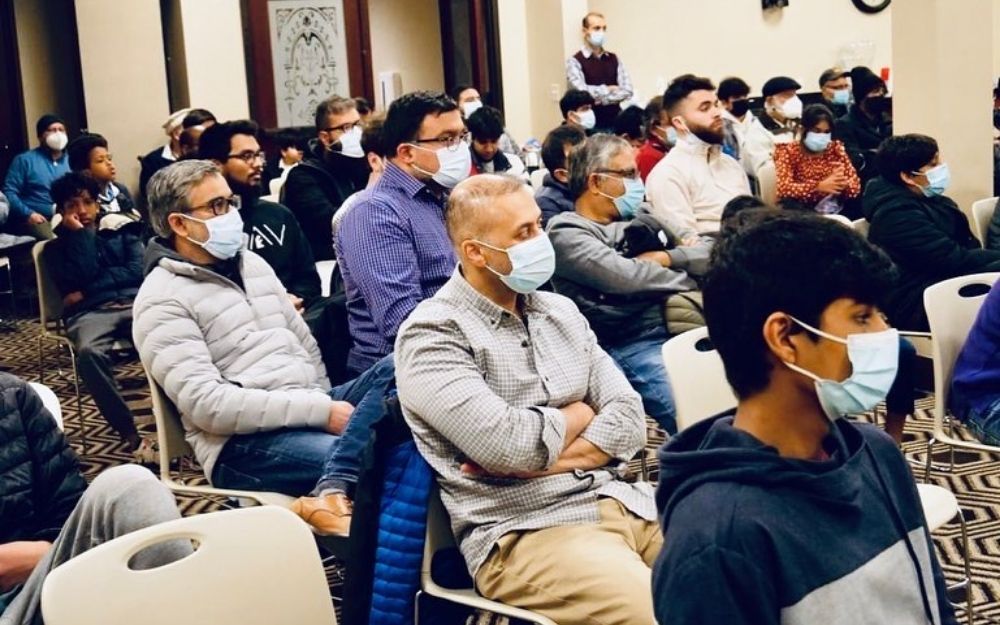
Muslims gathered at Masjid Al Noor in Brookfield to learn how to make their dua beneficial and meaningful.
“When we look at the life of the Prophet (pbuh), everything he did had a dua—waking, eating—it was literally a type of oxygen in the life of the Prophet. He understood he needed it in every circumstance.”
The Prophet showed us “every single moment of life is a time for dua, a time to connect with Allah,” Hussain said. “One of his followers mentions this very beautifully. He says, ‘Remember Allah in times of ease and Allah will remember you in times of difficulty.’ Every minute, every second of our day, is a time to turn back to Allah, and seek his forgiveness and help.”
Although Allah welcomes us to call on Him at all times, there are times that maximize the power of dua, Hussain said. In his talk, he shared specifics about the when and how to maximize the power of dua.
“As we come into Ramadan, we can take advantage of these opportunities,” he said.
What dua is not
“Sometimes we make dua as if we are requesting time off from work or a raise. It’s like sending an email: ‘Hey Boss, I need some money. I need some time off.’ I expect a response as soon as I raise my hand.
“Or you may think dua is like a cheat code in a video game. In a lot of games, if you want extra cash or weapons, you put that cheat code in and what happens? Your health would go back to 100%. You get all the weapons you want, all the cash you want. You press it. You apply it. Then, all of the sudden, everything will be ok. All the difficulties will be lifted from our lives.
“We feel we are entitled to everything we ask for. We feel we deserve everything we want. We feel we have the right to own everything we desire. When we are afflicted with the least of difficulties … we act with such loss of hope in Allah. It is important to understand that sometimes Allah deprives us to give us something better.”
The life of Prophet Muhammed (pbuh) and other prophets show they did not get immediate answers. When we make dua and ask for peace and good health, and relief from calamities and difficulties, sometimes “it seems as if nothing is happening, as if our duas are unheard,” Hussain said. We must remember dua is not a magical formula or a cheat code; “it is an experience we continue to build our lives on.”
Preparing for Ramadan
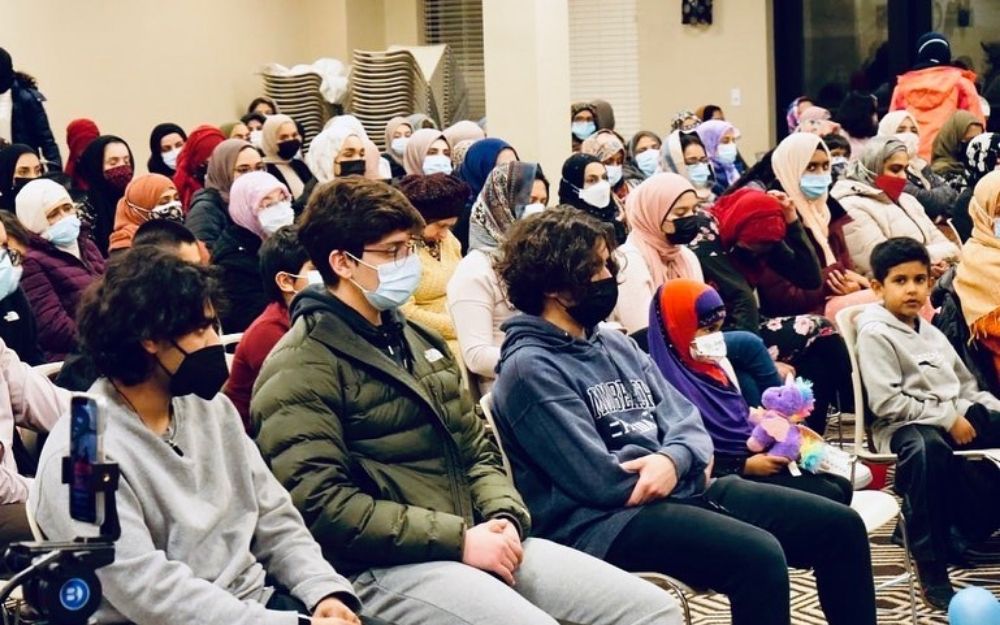
Shaykh Noman Hussain praised the crowd at Masjid Al Noor for including all ages, children and adults.
“When the month of Rajab came, the Prophet, peace be upon him, would change his routine because he wanted to prepare physically, spiritually, emotionally and mentally for the blessed month of Ramadan,” Hussain said. “It requires preparation. It’s a guest. It is the most beloved guest we will ever host in our lives.”
At the beginning of Rajab, Prophet Muhammad (peace be upon him), would recite a famous dua that “helps create the mindset of preparation and change in our lives,” Hussain said. “It says: ‘Allahuma Barik lana fi Rajaba wa Sha’bana wa ballighna Ramadhan,’ Oh, Allah, make the months of Rajab and Sha’ban blessed for us and allow us to reach the month of Ramadan. He was asking Allah to put baraka, His blessing, in these months.
“We have this season now. It is meant to be an opportunity for all of us to work together with our families and our communities, to work on our individual selves and increase in our relationship with Allah,” he said.
Ramadan is also a month of dua, Hussain said. It is a month of supplication. It is a month of prayers. It is a month of nida (pleas, calls).
“Dua is so connected to Ramadan that when Allah talks about Ramadan in the Quran, He introduces it by saying, “Tell my servant when he calls on me and makes dua to Me, say to him or her, that I am close.”
